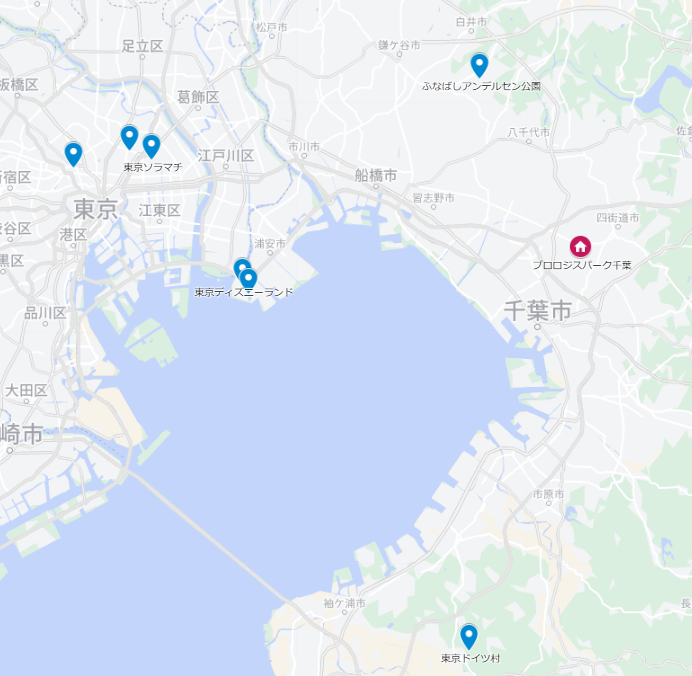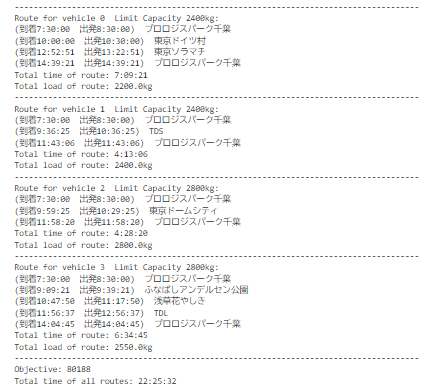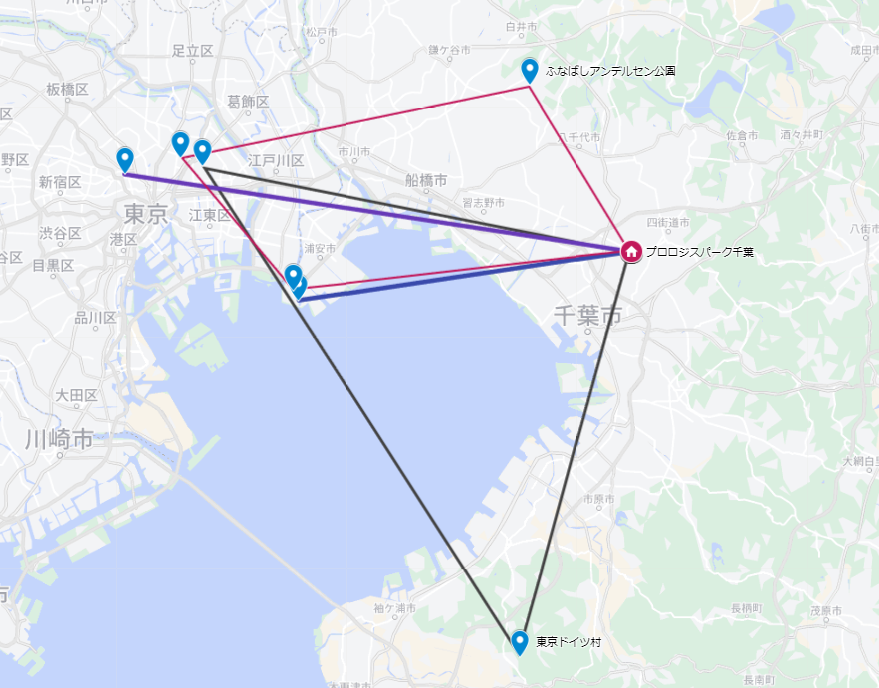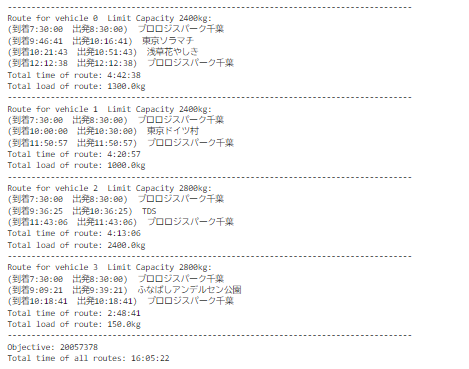目的
- 数理最適化を使用して最適な配送計画を作成してみる
- 記事確認いただいた初学者の方が以下の内容を達成できる
- 数理最適化の流れを理解する
- サンプルコードを通して実装方法を理解する
課題設定
私は運送会社の配車組担当。弊社では主に遊園地等の行楽地にメーカー請けの食品を輸送しており、卸先は全て近隣のため、当日出庫・当日納品を行っている。これまでは私の経験によって配送計画表を作成していたが、私が高齢になってきたことや、後進もおらず、個人的な都合をつけ辛いことから、これを自動化する仕組みがあれば活用を検討したい。
以下の情報から、移動時間と作業時間の総和が最小になるようにルート組みできないか。
<出庫地>
- 千葉の倉庫から荷物を積み、千葉・東京の各行楽地(配送先)へトラックで輸送する
- 出庫場所ではトラックへの積作業(60min)が発生
<卸地>
- 配送先には卸可能時間(X:XX~X:XX)が存在する
- 配送先では卸作業がそれぞれ発生する
<手配可能車両>
- トラックは4t×4台(積載限界量2.4t×2、2.8t×2)
- 積載限界量を超えては積めない
- いずれもAM7:30~ 8時間を超えての稼働は不可
参考
写経しつつ理解がお薦めです!
- OR-Toolsを使って巡回セールスマン問題を解き、
効率的に沼津の聖地巡礼をする - 第6回:OR-Toolsで巡回セールスマン問題を解く ~京都弾丸観光ツアーの作成を事例に~【ブレインパッドの数理最適化ブログ】
- Google公式ドキュメント
定式化
あまり数学に明るい方ではないですが(勉強中)、コスト関数と上記の条件を定式化してみます。
コスト関数(目的関数)
\displaylines{
t_{ij}:\quad Travel Time \quad and \quad Service Time\\
(i→j地点に移動した場合の移動時間+i地点での作業時間)\\
x_{ij}:\quad 1 \quad if \quad moves,\quad 0 \quad otherwise:\\
(車両vがi→j地点に移動した場合に1、そうでない場合0を示す決定変数)\\
Min \sum_{v=1}^{V} \sum_{i=0}^{n} \sum_{j=0, j≠i}^{n}t_{ij}x_{ijv}\\
(移動時間+作業時間の総和を最小化)
}
制約
車両の容量制約
\displaylines{
q_{i}:\quad Order Quantity\\
(i地点に配送する荷量)\\
Q_{v}:\quad Vehicle Limit Quantity\\
(車両vの積載限界量)\\
\sum_{v=1}^{V} \sum_{i=0}^{n}q_{i}x_{ijv} ≤ Qv \\
(車両vに積載する量は車両vの積載限界量以下)
}
配送先の到着時間枠制約
\displaylines{
TwStart_{i} \quad TwEnd_{i}:\quad TimeWindow\\
(i地点の配送可能開始時間、終了時間)\\
ArriveAt_{iv}:\quad Vehicle Arrival Time\\
(車両vがi地点に到着する時間)\\
TwStart_{i} ≤ArriveAt_{iv}≤TwEnd_{i} \\
(車両vがi地点に到着するのは配送可能時間以上、終了時刻以下)
}
車両の稼働時間制約
\displaylines{
W_{v}:\quad WorkngTime\\
(車両vの最大稼働可能時間)\\
t_{ij}:\quad Travel Time \quad and \quad Service Time\\
(i→j地点に移動した場合の移動時間+i地点での作業時間)\\
x_{ij}:\quad 1 \quad if \quad moves,\quad 0 \quad otherwise:\\
(車両vがi→j地点に移動した場合に1、そうでない場合0を示す決定変数)\\
\sum_{i=0}^{n} \sum_{j=0, j≠i}^{n}t_{ij}x_{ijv}≤W_{v}\\
(移動時間+作業時間の総和が車両vの最大稼働可能時間以下※一律値)
}
使用するライブラリ
# 最適化ツール
!pip install ortools
# 位置情報から経路距離を求める
!pip install OSMnx
!pip install networkx
# インポート
from ortools.constraint_solver import routing_enums_pb2
from ortools.constraint_solver import pywrapcp
import osmnx as ox
import networkx as nx
import numpy as np
import pandas as pd
import datetime
import warnings
warnings.simplefilter('ignore')
データ作成
配送地点情報
「プロロジスパーク千葉」が積み場所、他は配送先になります。
配送先はなんとなく馴染みのある場所にしてみました。
locations_demand = pd.DataFrame({'name':['プロロジスパーク千葉',
'東京ドイツ村',
'TDL',
'TDS',
'東京ソラマチ',
'浅草花やしき',
'ふなばしアンデルセン公園',
'東京ドームシティ'],
'address':['千葉県千葉市稲毛区六方町210−27',
'千葉県袖ケ浦市永吉419',
'千葉県浦安市舞浜1−1',
'千葉県浦安市舞浜1−13',
'東京都墨田区押上1丁目1−2',
'東京都台東区浅草2丁目28−1',
'千葉県船橋市金堀町525',
'東京都文京区後楽1丁目3−61'],
# 緯度経度
'lat':[35.65752312, 35.40588803, 35.63307077, 35.62710749, 35.71039879, 35.71560929, 35.76070174, 35.70553601],
'lon':[140.1386453, 140.0540462, 139.8803836, 139.885271 , 139.8115532, 139.7948823, 140.0616562, 139.7520476],
# 配送可能時間
'open':['6:00', '10:00', '8:00', '8:00', '7:30', '8:00', '8:00', '8:00'],
'close':['22:00', '10:00', '12:00', '12:00', '13:00', '11:00', '15:00', '15:00'],
# 地点での作業時間
'service_sec':[3600, 1800, 3600, 3600, 1800, 1800, 1800, 1800],
# 地点への配送荷量(g)
'demand_g':[0, 1000000, 2300000, 2400000, 1200000, 100000, 150000, 2800000]})
# openとcloseをsecondsに変換
locations_demand['open_time_sec'] = 0
locations_demand['close_time_sec'] = 0
for i in range(len(locations_demand)):
opening = locations_demand['open'].loc[i]
open_time_sec =3600*int(opening[ : opening.find(':')]) + 60*int(opening[ opening.find(':') + 1: ])
closing = locations_demand['close'].loc[i]
close_time_sec =3600*int(closing[ : closing.find(':')]) + 60*int(closing[ closing.find(':') + 1: ])
locations_demand['open_time_sec'].loc[i] = open_time_sec
locations_demand['close_time_sec'].loc[i] = close_time_sec
locations_demand

各地点間の距離と移動時間の算出
def culc_dist_durations(locations_demand):
# 距離計算
# https://osmnx.readthedocs.io/en/stable/user-reference.html#module-osmnx.graph
G = ox.graph.graph_from_address(address = '千葉県千葉市稲毛区',
dist = 50000,
dist_type = 'network',
network_type = 'drive',
simplify = True,
retain_all = False,
truncate_by_edge = False,
custom_filter = None)
durations = []
for i in locations_demand.index:
start_point_lat = locations_demand['lat'].loc[i]
start_point_lon = locations_demand['lon'].loc[i]
start_node = ox.distance.nearest_nodes(G, start_point_lon,start_point_lat)
durations_tmp = []
for j in locations_demand.index:
if i != j:
end_point_lat = locations_demand['lat'].loc[j]
end_point_lon = locations_demand['lon'].loc[j]
end_node = ox.distance.nearest_nodes(G, end_point_lon,end_point_lat)
dist_km = (nx.shortest_path_length(G, start_node, end_node, weight='length')/1000)
# 経路距離を時速25kmで換算し移動時間とする
dur_sec = int((3600*(dist_km/25)).round(0))
else:
dur_sec = 0
durations_tmp.append(dur_sec)
durations.append(durations_tmp)
# グラフを初期化
G=''
# 移動時間を返す
return durations
インプットデータに整形
# 車両の稼働開始時刻
start_time_at = '7:30'
start_time_at_sec = 3600*int(start_time_at[ : start_time_at.find(':')]) + 60*int(start_time_at[start_time_at.find(':') + 1 : ])
# 全車両に対し適用される限界稼働時間sec
time_limit_sec = 28800 # 8h=28800sで全箇所回り切れるか
# 許容する待機時間sec
slack_time_sec = 7200
list_name = locations_demand['name'].to_list()
service_time = locations_demand['service_sec'].to_list()
# 稼働開始がデポの開始時刻より遅い時
depot_open_time_at_sec = locations_demand['open_time_sec'].loc[0]
if start_time_at_sec >= depot_open_time_at_sec:
open_close_time_tmp = [tuple(x) for x in locations_demand[['open_time_sec', 'close_time_sec']].values - start_time_at_sec]
open_close_time = []
for x,y in open_close_time_tmp:
if x < 0:
x = 0
if y < 0:
y = 0
add = (x, y)
open_close_time.append(add)
# 稼働開始がデポの開始時刻より早い時
else:
open_close_time_tmp = [tuple(x) for x in locations_demand[['open_time_sec', 'close_time_sec']].values - depot_open_time_at_sec]
open_close_time = []
for x,y in open_close_time_tmp:
if x < 0:
x = 0
if y < 0:
y = 0
add = (x, y)
open_close_time.append(add)
data = {}
data['name'] = list_name
# data['time_matrix'] = culc_dist_durations(locations_demand)
# culc_dist_durations関数は情報取得に時間かかるのでコメントアウト
# 以下、上記のculc_dist_durationsの実行結果
data['time_matrix'] = [
[0, 4856, 4071, 3985, 4601, 4901, 2361, 5365],
[4857, 0, 7892, 7806, 8571, 8871, 6843, 9335],
[4088, 7913, 0, 123, 2095, 2395, 3667, 2647],
[4001, 7827, 122, 0, 2047, 2340, 3589, 2561],
[4590, 8562, 2065, 2050, 0, 302, 3868, 865],
[4855, 8827, 2327, 2311, 300, 0, 4107, 716],
[2360, 6844, 3660, 3574, 3883, 4109, 0, 4667],
[5335, 9307, 2588, 2573, 868, 703, 4614, 0]]
data['time_windows'] = open_close_time
data['service_time'] = service_time
data['depot'] = 0 # depotのインデックス
data['depot_open_time'] = locations_demand['open'].loc[0] # depotの開始時刻
data['depot_open_time_sec'] = depot_open_time_at_sec # depotの開始時刻 seconds表示
data['slack_time'] = slack_time_sec # 許容する待機時間
data['time_limit'] = time_limit_sec # 各車両の稼働限界時間
data['start_time'] = start_time_at # 車両の稼働開始時刻
data['start_time_sec'] = start_time_at_sec # 車両の稼働開始時刻 seconds表示
# 各地点への配送荷量
data['demands'] = list(locations_demand['demand_g'])
# 車両
data['vehicle_capacities'] = [2400000, 2400000, 2800000, 2800000] # 各車両の限界積載重量(g)
data['vehicles'] = 4 # 4台の車両を使用
data
data↓
{'name': ['プロロジスパーク千葉',
'東京ドイツ村',
'TDL',
'TDS',
'東京ソラマチ',
'浅草花やしき',
'ふなばしアンデルセン公園',
'東京ドームシティ'],
'time_matrix': [[0, 4856, 4071, 3985, 4601, 4901, 2361, 5365],
[4857, 0, 7892, 7806, 8571, 8871, 6843, 9335],
[4088, 7913, 0, 123, 2095, 2395, 3667, 2647],
[4001, 7827, 122, 0, 2047, 2340, 3589, 2561],
[4590, 8562, 2065, 2050, 0, 302, 3868, 865],
[4855, 8827, 2327, 2311, 300, 0, 4107, 716],
[2360, 6844, 3660, 3574, 3883, 4109, 0, 4667],
[5335, 9307, 2588, 2573, 868, 703, 4614, 0]],
'time_windows': [(0, 52200),
(9000, 9000),
(1800, 16200),
(1800, 16200),
(0, 19800),
(1800, 12600),
(1800, 27000),
(1800, 27000)],
'service_time': [3600, 1800, 3600, 3600, 1800, 1800, 1800, 1800],
'depot': 0,
'depot_open_time': '6:00',
'depot_open_time_sec': 21600,
'slack_time': 7200,
'time_limit': 28800,
'star(t_time': '7:30',
'start_time_sec': 27000,
'demands': [0, 1000000, 2300000, 2400000, 1200000, 100000, 150000, 2800000],
'vehicle_capacities': [2400000, 2400000, 2800000, 2800000],
'vehicles': 4}
最適化モデルを作成
Routing Managerの作成
manager = pywrapcp.RoutingIndexManager(
len(data['time_matrix']), # 訪問したい地点の数
data['vehicles'], # 使う車両の数
data['depot'] # depotのindex
)
Routing Modelを作成(以下「モデル」)
routing = pywrapcp.RoutingModel(manager)
移動時間+作業時間を返す関数をモデルに登録
def time_callback(from_index, to_index):
from_node = manager.IndexToNode(from_index)
to_node = manager.IndexToNode(to_index)
travel_time = data['time_matrix'][from_node][to_node]
service_time = data['service_time'][from_node]
# 移動時間と地点の作業時間を足し合わせる
return travel_time + service_time
transit_callback_index = routing.RegisterTransitCallback(time_callback)
コストの設定
# ArcCostの設定(本件では移動時間+作業時間)
routing.SetArcCostEvaluatorOfAllVehicles(transit_callback_index)
配送先への荷量(=需要量の設定)を返す関数をモデルに登録
def demand_callback(from_index):
from_node = manager.IndexToNode(from_index)
return data['demands'][from_node]
demand_callback_index = routing.RegisterUnaryTransitCallback(demand_callback)
容量ディメンションを追加
capacity = 'Capacity'
routing.AddDimensionWithVehicleCapacity(
demand_callback_index,
0,
data['vehicle_capacities'],
True,
capacity)
時間枠ディメンションを追加
time = 'Time'
routing.AddDimension(
transit_callback_index,
data['slack_time'],
data['time_limit'],
False,
time)
time_dimension = routing.GetDimensionOrDie(time)
各地点について時間枠の制約を追加する
for location_idx, time_window in enumerate(data['time_windows']):
if location_idx == data['depot']:
continue
index = manager.NodeToIndex(location_idx)
time_dimension.CumulVar(index).SetRange(int(time_window[0]), int(time_window[1]))
稼働開始時間の時間枠の制約を各車両に追加する(depotの時間内に開始)
depot_idx = data['depot']
for vehicle_id in range(data['vehicles']):
index = routing.Start(vehicle_id)
time_dimension.CumulVar(index).SetRange(
int(data['time_windows'][depot_idx][0]), int(data['time_windows'][depot_idx][1]))
for i in range(data['vehicles']):
routing.AddVariableMinimizedByFinalizer(time_dimension.CumulVar(routing.Start(i)))
routing.AddVariableMinimizedByFinalizer(time_dimension.CumulVar(routing.End(i)))
地点に行かなかった(制約上、行けなかった)場合に加算されるコスト(ペナルティ)
penalty = 10000000
for node in range(1, len(data['time_matrix'])):
routing.AddDisjunction([manager.NodeToIndex(node)], penalty)
計算のパラメータ
search_parameters = pywrapcp.DefaultRoutingSearchParameters()
search_parameters.local_search_metaheuristic = (
routing_enums_pb2.LocalSearchMetaheuristic.GUIDED_LOCAL_SEARCH) # 指定時間で厳密解を探索
search_parameters.time_limit.seconds = 10 # 計算時間を10sで指定
結果出力
# 結果の表示
def print_solution(data, manager, routing, solution):
time_dimension = routing.GetDimensionOrDie('Time')
total_time = 0
total_load = 0
for vehicle_id in range(data['vehicles']):
print('-------------------------------------------------------------------------------------')
index = routing.Start(vehicle_id)
_vehicle_capacity_kg = int(data['vehicle_capacities'][vehicle_id]/1000)
print('Route for vehicle {0} Limit Capacity {1}kg:'.format(vehicle_id, _vehicle_capacity_kg))
total_time_route = 0
total_load_route = 0
if data['start_time_sec'] >= data['depot_open_time_sec']:
while not routing.IsEnd(index):
time_var = time_dimension.CumulVar(index)
h = int(data['start_time'][ : data['start_time'].find(':')])
m = int(data['start_time'][data['start_time'].find(':') + 1 : ])
print( '(到着{1} 出発{2}) {0}'.format(
data['name'][manager.IndexToNode(index)],
datetime.timedelta(hours=h, minutes=m, seconds=solution.Min(time_var)),
datetime.timedelta(hours=h, minutes=m, seconds=solution.Max(time_var) + data['service_time'][manager.IndexToNode(index)])
)
)
total_load_route += data['demands'][manager.IndexToNode(index)]
index = solution.Value(routing.NextVar(index))
time_var = time_dimension.CumulVar(index)
h = int(data['start_time'][ : data['start_time'].find(':')])
m = int(data['start_time'][data['start_time'].find(':') + 1 : ])
print('(到着{1} 出発{2}) {0}'.format(
data['name'][manager.IndexToNode(index)],
datetime.timedelta(hours=h, minutes=m, seconds=solution.Min(time_var)),
datetime.timedelta(hours=h, minutes=m, seconds=solution.Max(time_var)) # 戻り時は作業時間を加算しない
)
)
else:
while not routing.IsEnd(index):
time_var = time_dimension.CumulVar(index)
h = int(data['depot_open_time'][ : data['depot_open_time'].find(':')])
m = int(data['depot_open_time'][data['depot_open_time'].find(':') + 1 : ])
print( '(到着{1} 出発{2}) {0}'.format(
data['name'][manager.IndexToNode(index)],
datetime.timedelta(hours=h, minutes=m, seconds=solution.Min(time_var)),
datetime.timedelta(hours=h, minutes=m, seconds=solution.Max(time_var) + data['service_time'][manager.IndexToNode(index)])
)
)
total_load_route += data['demands'][manager.IndexToNode(index)]
index = solution.Value(routing.NextVar(index))
time_var = time_dimension.CumulVar(index)
h = int(data['depot_open_time'][ : data['depot_open_time'].find(':')])
m = int(data['depot_open_time'][data['depot_open_time'].find(':') + 1 : ])
print('(到着{1} 出発{2}) {0}'.format(
data['name'][manager.IndexToNode(index)],
datetime.timedelta(hours=h, minutes=m, seconds=solution.Min(time_var)),
datetime.timedelta(hours=h, minutes=m, seconds=solution.Max(time_var)) # 戻り時は作業時間を加算しない
)
)
total_time_route = solution.Min(time_var)
total_time += total_time_route
print(total_time_route)
total_load += total_load_route
print('Total time of route: {}'.format(datetime.timedelta(seconds=total_time_route)))
print('Total load of route: {}kg'.format((total_load_route)/1000))
print('-------------------------------------------------------------------------------------')
print(f'Objective: {solution.ObjectiveValue()}')
print('Total time of all routes: {}'.format(datetime.timedelta(seconds=total_time)))
最適化モデル計算実行
solution = routing.SolveWithParameters(search_parameters)
# 解が見つかれば結果出力
if solution:
print_solution(data, manager, routing, solution)
# 解が見つからぬ場合
else:
print('No solution found.')
出力結果
制約条件を満たしていることがわかります。
- いずれの車両も8h内の稼働時間に収まっている
- いずれの配送先にも時間枠内に到着できている
- 各車両の限界積載量を超えていない
ちなみにこれを5h内の稼働時間という制約で実行すると・・・
time_limit_sec = 18000
- Objectiveが2千万弱と二か所の配送先に行けていないことでペナルティ(2箇所×10000000)が加算されている
- 行けなかった配送先は「東京ドームシティ」「TDL」
- vehicle=3は積載残2650kg、稼働時間残2.2h程度。TDL分は積載できないのか?
- ふなばしアンデルセン公園からTDLまでの移動時間は3660s、卸作業が3600s、TDLから発地までの移動時間は4088s、合計3.15hは必要になる。稼働時間の残時間では配送できないため、積載できない
最適化モデルコードまとめ
def main(data):
# Routing Managerを作成
manager = pywrapcp.RoutingIndexManager(
len(data['time_matrix']), # 訪問したい地点の数
data['vehicles'], # 使う車両の数
data['depot'] # depotのindex
)
# Routing Modelを作成
routing = pywrapcp.RoutingModel(manager)
def time_callback(from_index, to_index):
from_node = manager.IndexToNode(from_index)
to_node = manager.IndexToNode(to_index)
travel_time = data['time_matrix'][from_node][to_node]
service_time = data['service_time'][from_node]
# 移動時間と配送先での滞在時間を足し合わせる
return travel_time + service_time
transit_callback_index = routing.RegisterTransitCallback(time_callback)
# Arc Costの設定
routing.SetArcCostEvaluatorOfAllVehicles(transit_callback_index)
# demandの設定
def demand_callback(from_index):
# Convert from routing variable Index to demands NodeIndex.
from_node = manager.IndexToNode(from_index)
return data['demands'][from_node]
demand_callback_index = routing.RegisterUnaryTransitCallback(demand_callback)
# 容量ディメンションを追加
capacity = 'Capacity'
routing.AddDimensionWithVehicleCapacity(
demand_callback_index,
0, # null capacity slack
data['vehicle_capacities'],
True, # start cumul to zero
capacity)
# 時間枠ディメンションを追加
time = 'Time'
routing.AddDimension(
transit_callback_index,
data['slack_time'],
data['time_limit'],
False,
time)
time_dimension = routing.GetDimensionOrDie(time)
# 各地点について時間の制約を追加する
for location_idx, time_window in enumerate(data['time_windows']):
index = manager.NodeToIndex(location_idx)
time_dimension.CumulVar(index).SetRange(int(time_window[0]), int(time_window[1]))
# 稼働開始時間の時間枠の制約を各車両に追加する
depot_idx = data['depot']
for vehicle_id in range(data['vehicles']):
index = routing.Start(vehicle_id)
time_dimension.CumulVar(index).SetRange(
int(data['time_windows'][depot_idx][0]),
int(data['time_windows'][depot_idx][1]))
for i in range(data['vehicles']):
routing.AddVariableMinimizedByFinalizer(time_dimension.CumulVar(routing.Start(i)))
routing.AddVariableMinimizedByFinalizer(time_dimension.CumulVar(routing.End(i)))
# 地点に行かなかった(制約上、行けなかった)場合に加算されるコスト(ペナルティ)
penalty = 10000000
for node in range(1, len(data['time_matrix'])):
routing.AddDisjunction([manager.NodeToIndex(node)], penalty)
# 計算時のパラメータ
search_parameters = pywrapcp.DefaultRoutingSearchParameters()
search_parameters.local_search_metaheuristic = (
routing_enums_pb2.LocalSearchMetaheuristic.GUIDED_LOCAL_SEARCH)
search_parameters.time_limit.seconds = 10
# 結果の表示
def print_solution(data, manager, routing, solution):
time_dimension = routing.GetDimensionOrDie('Time')
total_time = 0
total_load = 0
for vehicle_id in range(data['vehicles']):
print('-------------------------------------------------------------------------------------')
index = routing.Start(vehicle_id)
_vehicle_capacity_kg = int(data['vehicle_capacities'][vehicle_id]/1000)
print('Route for vehicle {0} Limit Capacity {1}kg:'.format(vehicle_id, _vehicle_capacity_kg))
total_time_route = 0
total_load_route = 0
if data['start_time_sec'] >= data['depot_open_time_sec']:
while not routing.IsEnd(index):
time_var = time_dimension.CumulVar(index)
h = int(data['start_time'][ : data['start_time'].find(':')])
m = int(data['start_time'][data['start_time'].find(':') + 1 : ])
print( '(到着{1} 出発{2}) {0}'.format(
data['name'][manager.IndexToNode(index)],
datetime.timedelta(hours=h, minutes=m, seconds=solution.Min(time_var)),
datetime.timedelta(hours=h, minutes=m, seconds=solution.Max(time_var) + data['service_time'][manager.IndexToNode(index)])
)
)
total_load_route += data['demands'][manager.IndexToNode(index)]
index = solution.Value(routing.NextVar(index))
time_var = time_dimension.CumulVar(index)
h = int(data['start_time'][ : data['start_time'].find(':')])
m = int(data['start_time'][data['start_time'].find(':') + 1 : ])
print('(到着{1} 出発{2}) {0}'.format(
data['name'][manager.IndexToNode(index)],
datetime.timedelta(hours=h, minutes=m, seconds=solution.Min(time_var)),
datetime.timedelta(hours=h, minutes=m, seconds=solution.Max(time_var)) # 戻り時は作業時間を加算しないで表示
)
)
else:
while not routing.IsEnd(index):
time_var = time_dimension.CumulVar(index)
h = int(data['depot_open_time'][ : data['depot_open_time'].find(':')])
m = int(data['depot_open_time'][data['depot_open_time'].find(':') + 1 : ])
print( '(到着{1} 出発{2}) {0}'.format(
data['name'][manager.IndexToNode(index)],
datetime.timedelta(hours=h, minutes=m, seconds=solution.Min(time_var)),
datetime.timedelta(hours=h, minutes=m, seconds=solution.Max(time_var) + data['service_time'][manager.IndexToNode(index)])
)
)
total_load_route += data['demands'][manager.IndexToNode(index)]
index = solution.Value(routing.NextVar(index))
time_var = time_dimension.CumulVar(index)
h = int(data['depot_open_time'][ : data['depot_open_time'].find(':')])
m = int(data['depot_open_time'][data['depot_open_time'].find(':') + 1 : ])
print('(到着{1} 出発{2}) {0}'.format(
data['name'][manager.IndexToNode(index)],
datetime.timedelta(hours=h, minutes=m, seconds=solution.Min(time_var)),
datetime.timedelta(hours=h, minutes=m, seconds=solution.Max(time_var)) # 戻り時は作業時間を加算しないで表示
)
)
total_time_route = solution.Min(time_var)
total_time += total_time_route
print(total_time_route)
total_load += total_load_route
print('Total time of route: {}'.format(datetime.timedelta(seconds=total_time_route)))
print('Total load of route: {}kg'.format((total_load_route)/1000))
print('-------------------------------------------------------------------------------------')
print(f'Objective: {solution.ObjectiveValue()}')
print('Total time of all routes: {}'.format(datetime.timedelta(seconds=total_time)))
# 最適化計算実行
solution = routing.SolveWithParameters(search_parameters)
if solution:
print_solution(data, manager, routing, solution)
else:
print('No solution found.')
main(data)



